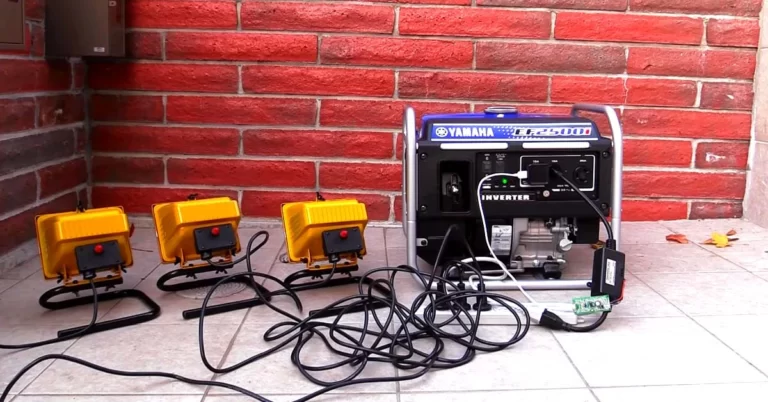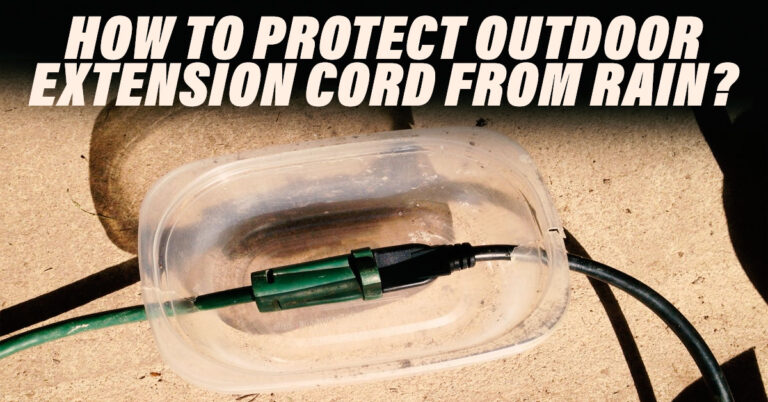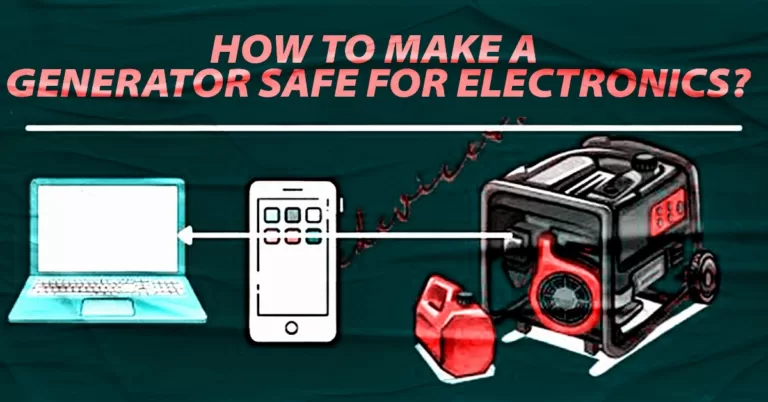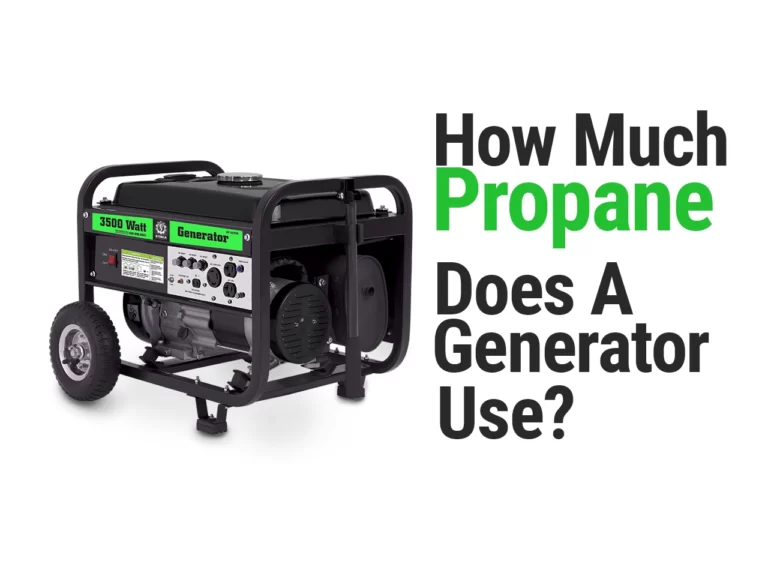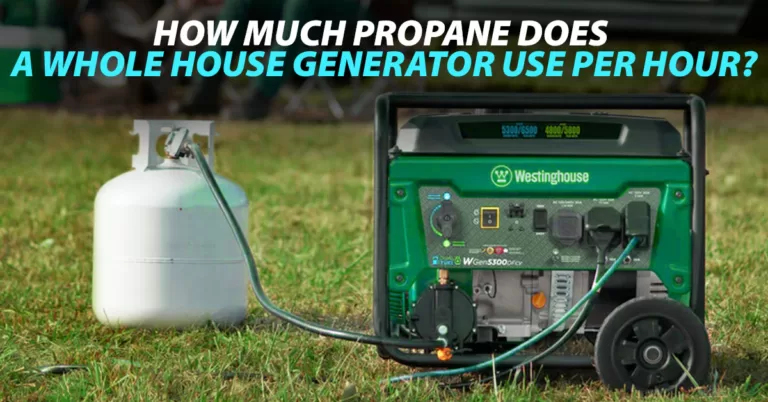How To Clean Up Generator Power For Electronics
Clean power is essential for safe and efficient appliance operation. Both old and new generators often produce “dirty power,” which can be harmful to electronics and equipment. To address the question of how to clean up generator power for electronics, there are straightforward methods to obtain clean power, including inverter generators, UPS systems, power line conditioners, and power filters.
For a detailed exploration of these methods and to enhance your understanding, read on. I will also provide insights into questions like the importance of cleaning power, the definition of dirty power, its causes, signs of poor power quality, and the reasons for cleaning generator power. Keep reading for a comprehensive understanding.
5 Way: How To Clean Up Generator Power For Electronics
To ensure your generator gives you clean, steady power, you must fix any problems with “dirty” power. Many people use generators when the regular power goes out, and newer generators are better claimed to provide cleaner power than old ones because older generators might produce dirty electricity. But some generators can give you dirty power, making your lights flicker and causing power surges. There are 9 good solutions To fix dirty power and clean up generators:
Buy an Inverter Generator

Consider investing in an inverter generator if you face persistent dirty power issues with your current generator. Inverter generators are known for their “smart” operation, adjusting power output according to the load, which helps save fuel and energy. They guarantee a steady supply of clean power since they do not rely on conventional mechanical alternators.
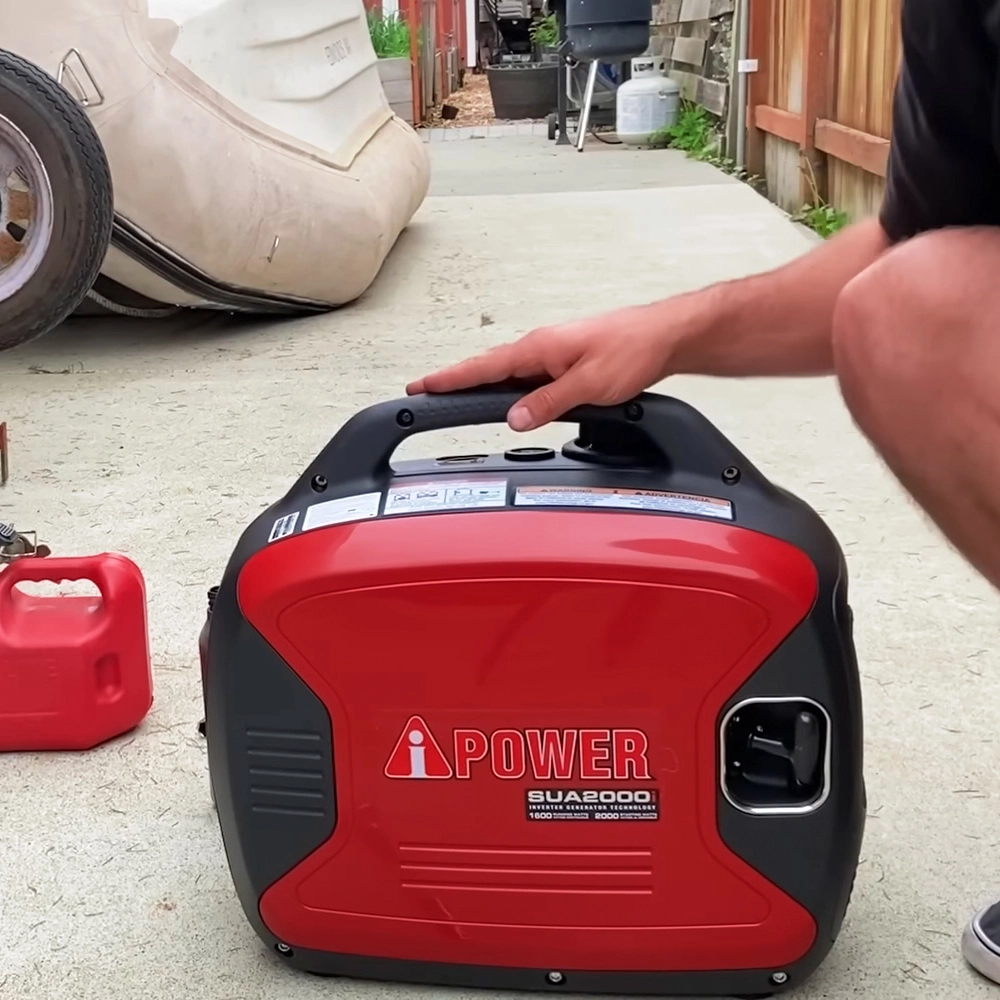
These generators can detect and eliminate harmonic distortion, providing pure sine waves to protect voltage-sensitive appliances from damage. In addition to clean power, inverter generators are quieter, easier to maintain, and more efficient than conventional generators. While they may be a bit more expensive, they offer a worthwhile solution for clean electricity, especially if you haven’t already invested in a generator.
How to Clean Up Generator Power with a UPS

It would help if you located a certain UPS that can connect to your generator in order to use a UPS (Uninterruptible Electricity System) to clean up generator power. A UPS device is designed to ensure an uninterrupted power supply, typically used with desktops or PCs to safeguard data during power outages. It contains basic circuitry and large batteries, which can be connected to generators to smooth the electrical wave. The UPS converts dirty electricity into a clean sine wave, making it safe for your equipment.
A smart UPS is recommended for cleaner power at home, providing power for sensitive electronics. Placing the UPS between the generator and your appliances offers distortion-free power and a backup when the generator runs out of fuel.
Some UPS models include an Automatic Voltage Regulator (AVR) to provide the cleanest power, especially addressing voltage variations. However, a UPS may not be the ideal solution if your power issues involve frequency variations. It’s crucial to research and choose a UPS compatible with your generator’s frequency to prevent costly repairs in the future. Mismatched UPS and generator combinations can be hazardous and ineffective.
How to Clean Up Generator Power with a Separate Voltage Regulator

To clean up generator power using a separate Voltage Regulator (AVR), you can counter frequency variations and ensure clean power from your generator. AVR, commonly used in automobiles, stabilizes the generator’s RPM, resulting in a clean sine wave voltage that prevents potential damage from voltage-sensitive appliances. It detects power supply changes and adjusts them based on the load, eliminating dirty power without needing DC conversion.
When selecting an AVR, ensure it matches your generator’s capacity and can handle the load. You can also consider adding a surge suppressor for added protection. Voltage regulators differ from UPS systems in that they focus on regulating the actual voltage output rather than smoothing the AC curve, making them essential for maintaining a steady voltage to prevent fluctuations or brownouts.
Just like with UPS systems, choosing an AVR compatible with your specific generator is essential. Bringing your portable or standby generator’s details when shopping for an AVR can help you find the right fit.
How to Use a Power Line Conditioner to Clean Up Generator Power

You can use a power line conditioner to clean up generator power and protect your valuable appliances from voltage damage. It’s an affordable, user-friendly option that reduces voltage fluctuations and ensures stable power for sensitive devices.
Power line conditioners are a superior option to portable generator surge protectors since they can efficiently control electrical surges. However, they may not clean up modified sine waves from open-frame generators. Be cautious when choosing the right one to match your portable generator for optimal results.
How to Clean Up Generator Power with a Standalone Inverter

A standalone inverter is a viable solution to clean up generator power, especially if you don’t have an inverter generator. Standalone inverters convert the generator’s DC output into AC output with smoother sine waves, ensuring that voltage-sensitive appliances receive cleaner power. They can adjust power output, stabilize it, and maintain the generator’s speed based on the connected load, enhancing fuel efficiency.
When using an inverter with a generator, you can control its speed, allowing it to operate at lower speeds and under lighter loads, ultimately reducing fuel costs.
However, standalone inverters have a drawback regarding power loss. You may require a larger generator to compensate for this loss. Investing in an inverter generator may be more practical than purchasing additional equipment and making connections.
Consider the following when using a standalone inverter to clean up generator power:
- Ensure that the standalone inverter is rated for the wattage of the electronics you intend to use.
- Account for inverter efficiency, as some power is lost in the conversion process when sizing the inverter.
- Some standalone inverters offer a “pure sine wave” output, which is the cleanest type of AC power and ideal for sensitive electronics.
How to Clean Up Generator Power with a Power Filters
Power filters can help make your electricity more stable and cleaner, though not as much as expensive options like UPS or inverters. They work by reducing interference in the electricity, making your devices work better and quieter.
There are two types:
- Passive filters are basic and affordable and good at removing certain electrical issues.
- Active filters are more advanced and expensive but very good at fixing different power problems by creating a signal to cancel out disturbances and give you clean power.
How to Clean Up Generator Power Using the Surge Protector

A surge protector is essential to shield electronic devices from power surges, whether from generator issues or the grid. For a surge protector to work properly, proper grounding is essential.
Over time, surge protectors lose their capacity to absorb power surges, so selecting one that matches your generator’s wattage and has a joule rating of at least 1000 joules is important. Opt for high-quality surge protectors, replace them as needed, and ensure correct installation to prevent power surges.
How to Clean Up Generator Power Using Backup Battery

Using a backup battery is an effective way to clean up generator power for your electronics. Generators can produce “dirty” power with voltage spikes and irregularities that harm sensitive electronic equipment. Charging a battery with the generator provides clean backup power for your devices. However, since batteries have limited capacity, running only one or two devices on them is advisable to ensure a stable power supply.
Calling a Technician
Calling a technician is a wise choice if you’re facing generator power issues and don’t want to buy a new one. A professional can safely assess and fix your generator, ensuring clean and stable power for your electronics.
Other Alternatives
If the solutions mentioned earlier don’t fix the power problems with your generator, you should check the generator itself. Sometimes, the power fluctuations happen because of loose or damaged wires, weak connections, or a dirty engine. The engine may suffer damage if the oil filter is not changed. Therefore, ensure that your generator is in good operating order before contacting a professional.
What Is Dirty Power?
Dirty power, also known as electrical pollution, can hurt your home and important gadgets. It happens when your appliances get electricity that’s not quite right, with problems like the voltage going up and down, the frequencies being all over the place, and less effective power. If you plug your stuff into a generator with dirty power, it could damage them for a little while or even break them for good.
You’ll notice dirty power when your lights flicker, and your machines make noise, your electronics shake, and your circuit breakers trip often. It can also make things not work as they should, like your phone not charging properly or your fridge not staying cold enough. This happens more to devices that need really clean electricity.
Why Do You Need To Clean Power?
Having clean and stable power is very important. Dirty power, which can make your lights flicker and cause issues like equipment problems, is not good. This is especially a problem for sensitive electronics like phones and computers because they can get damaged by dirty power.
Generators can sometimes give you dirty power because they don’t match what your devices need. Ignoring this issue might result in financial loss and harm to your equipment. Dirty power can happen because of surges, changes in frequency, and voltage fluctuations.
To find out if your power is dirty, pay attention to your electronic devices like phones and laptops because they can show you if the power is not right. It’s important to fix dirty power to protect your appliances and have steady electricity.
What Are The Causes Of Dirty Power
Dirty power, which is when your electricity isn’t quite right, can happen for different reasons. Understanding the root of the issue is necessary to find a solution:
Fuel Problems
Sometimes, dirty fuel can clog up your generator and make the electricity go up and down.
Too Much Disturbance
Suppose your generator has more than 15% Total Harmonic Distortion (THD). In that case, it can’t give clean and good electricity to devices that need it.
Overloading
If you ask your generator to do too much, it can start acting funny and making strange noises.
Bad Wires
If the wires in your generator are damaged, they can be unsafe and harm your gadgets.
Old Oil
Used oil can hurt your generator’s engine and mess with the electricity it makes.
Dirty Spark Plug
A spark plug that’s not clean can cause problems with how your generator works.
Broken Generator
If your generator’s Automatic Voltage Regulator (AVR) or capacitor is broken, it can mess up the power.
Not Taking Care of It
If you don’t look after your generator, the power it makes can be unstable. Things like dirty filters can mess up how it works.
To fix dirty power
- Check your generator and how everything is connected.
- Use clean fuel and store it in a clean place.
- Keep your generator clean.
- Check and change filters regularly.
- Change the oil and fuel filters.
- Watch the battery’s level of charge and replace it as necessary.
- Observe the guidelines provided in the manufacturer’s user handbook.
Taking care of your generator and dealing with the main problems can help you get better electricity from it.
What Indicates Poor Power Quality?
Bad electricity can show itself in different ways, like:
- Lights that go on and off.
- Machines that don’t work right or break.
- Losing or messing up computer data.
- Electricity that’s not steady.
- Power that’s not used well.
- Breakers that keep shutting off.
- Appliances are getting too hot.
- Devices that move slower.
- Using more electricity than needed.
- Machines like well pumps are not working well.
- Machines making strange noises and shaking.
- In serious cases, dirty electricity can cause fires, electric shocks, and harm sensitive electronic stuff.
It would be best if you got an expert electrician to check these issues and use special tools to find out what’s wrong and how to fix it. You can spot it early with tools like the Green Wave Broadband EMI Dirty Electricity Meter.
Why Should You Clean the Power from the Generator?
It’s crucial to clean the power coming from your generator for the following reasons:
- To keep devices like phones and laptops safe from power problems.
- So machines like pumps and fans work better.
- To avoid breakers from shutting off all the time.
- Notice if your devices get too hot or shake, which can be a sign of power issues.
- To make sure all your appliances work.
Cleaning your generator’s power also gives you these benefits:
- A clean generator works better because it doesn’t get too hot or have stuff blocking it.
- Cleaning your generator helps it last a really long time because it doesn’t get rusty.
- Clean power parts don’t mess up and cause problems.
- A clean generator is less likely to break and cause accidents.
- Clean generators look good, especially if other people can see them.
Plus, cleaning your generator stops pests and diseases from getting in. Dirt and junk can attract pests like bugs and rodents, and they can mess up the fuel and air supply, which causes problems.
Comparing Clean and Dirty Power: An Actual Analysis of the Distinction
| Feature | Dirty power | Clean power |
|---|---|---|
| Definition | Electricity that is not a pure sinusoidal wave | Electricity that is a pure sinusoidal wave |
| Characteristics | Voltage spikes, surges, drops, sags, transients, noise, harmonics | Consistent voltage and frequency |
| Causes | Switching power supplies, arc welders, motors, fluorescent lights, lightning strikes | Utility companies, solar panels, wind turbines, hydroelectric generators, geothermal generators |
| Effects | Data loss, equipment damage, reduced lifespan of electronics, audio and video interference, health problems | No known negative effects |
| Purpose | Allows appliances to work at full intensity, provides irregular blocky waves | Ensures appliance safety, provides pure sine waves, prevents harm to appliances |
FAQs
Do generators make cleaner power, and how can they do it?
Yes, generators can produce cleaner power, especially if they have special technology like inverters or automatic voltage regulators (AVRs) to control something called Total Harmonic Distortion (THD). The lower the THD, ideally less than 10%, the cleaner the power.
Can regular generators hurt your electronics, and when are they safe?
Normal generators can potentially harm electronics if they have really high THD levels. But modern ones with AVRs that keep THD under 15% are generally safe for electronics.
How can you make the electricity from your generator cleaner, and why is it a big deal?
To make your generator’s power cleaner, you can use things like power line conditioners or take good care of your generator. It’s a big deal because dirty power can break your appliances, make your stuff not work right, and cause lots of problems.
Do portable generators harm your stuff, and how?
Yes, portable generators can potentially harm your appliances, especially if they don’t have special tech like inverters or AVRs. Bad electricity can damage sensitive electronics.
Conclusion
To sum up, maintaining clean power from your generator is crucial for sensitive devices and appliances to operate safely and effectively. Addressing the issue of dirty power with methods like inverter generators, UPS systems, voltage regulators, power line conditioners, power filters, surge protectors, backup batteries, and professional maintenance can significantly improve power quality and protect your valuable equipment.
Regular maintenance and proper care of your generator are fundamental in ensuring that it provides clean and stable power. So, whether you’re experiencing flickering lights or equipment malfunctions, taking the necessary steps to clean up generator power for electronics is crucial for the reliable operation of your devices.


